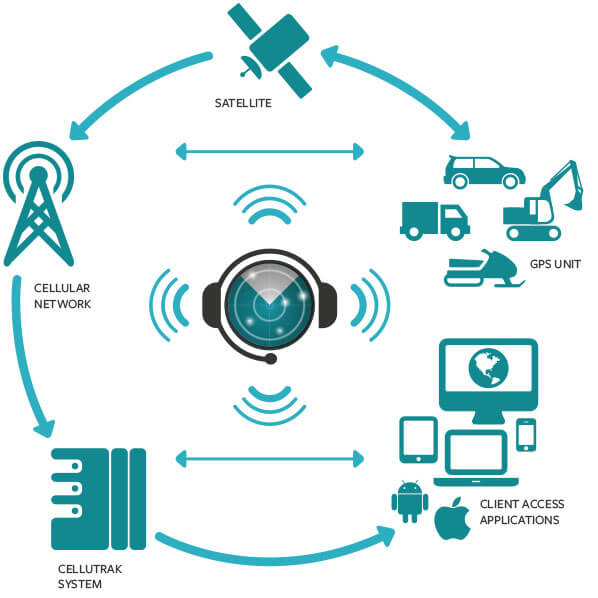
Artificial Intelligence (AI) has emerged as a game-changer in various industries, and its impact on Global Positioning System (GPS) tracking is no exception. GPS tracking, once a straightforward technology designed to determine the location of vehicles or assets, is now being enhanced by AI to offer far more sophisticated functionalities. In Canada, AI-powered GPS systems are reshaping industries such as transportation, logistics, and construction, delivering greater efficiency, accuracy, and decision-making capabilities.
The integration of AI into GPS tracking systems is proving especially beneficial to businesses that rely on fleet management or asset monitoring. From real-time traffic updates to predictive maintenance, AI-driven GPS solutions offer advantages that far surpass the capabilities of traditional GPS systems. This shift toward smarter tracking solutions is setting a new standard for navigation and asset security.
Understanding GPS Tracking
GPS technology has a fascinating history, originating in the U.S. military's quest to create a reliable navigation system for their operations in the 1970s. Over time, this technology became available for commercial and personal use, and today it is an indispensable tool in industries like logistics, transportation, and personal navigation.
Traditional GPS systems provide real-time data on the location of assets or individuals, but they have several limitations. For instance, they cannot predict changes in traffic patterns, anticipate mechanical failures, or detect anomalies in driver behavior. These shortcomings reduce the efficiency of GPS systems, particularly in industries where timely decisions can significantly impact operational success.
AI is now filling these gaps by offering solutions to many of these challenges. By using data analytics and machine learning algorithms, AI can provide predictive insights that allow businesses to make proactive decisions. For instance, AI can analyze historical data to predict traffic congestion, allowing drivers to reroute and avoid delays. This level of intelligence transforms GPS tracking in Canada from a simple navigation tool into a strategic asset for businesses.
Enhanced Capabilities of AI-Powered GPS Tracking
AI has introduced a range of enhanced capabilities that significantly improve the effectiveness of GPS tracking systems. Here are some of the most notable advancements:
Real-Time Traffic Updates and Route Optimization
One of the most useful applications of AI in GPS tracking is real-time traffic updates and dynamic route optimization. AI analyzes traffic patterns and provides instant updates to drivers, helping them avoid congested roads or accidents. This not only saves time but also reduces fuel consumption, leading to lower operational costs for businesses. AI-powered GPS systems can also suggest alternative routes based on the driver’s location, weather conditions, and other variables.
Predictive Analytics for Incident Prevention
In addition to optimizing routes, AI can predict incidents that may affect operations, such as vehicle breakdowns or road closures. Predictive analytics allow businesses to prevent problems before they occur, improving efficiency and safety. For example, AI can analyze vehicle data and predict when maintenance is needed, reducing the risk of sudden mechanical failures on the road.
Integration with Other Technologies
AI-powered GPS systems are often integrated with other technologies, such as the Internet of Things (IoT), machine learning, and cloud computing. This integration enables businesses to monitor their assets in real time and make data-driven decisions. For example, IoT sensors can provide data on vehicle conditions, while AI analyzes this information to suggest maintenance or operational improvements.
Increased Accuracy and Precision
Another major advantage of AI-powered GPS tracking is the increased level of accuracy it provides. Traditional GPS systems can struggle with pinpointing exact locations in complex environments, such as urban areas with tall buildings or dense forests. AI algorithms, on the other hand, process large datasets and adjust for environmental variables, ensuring more precise location data.
Geofencing and Boundary Monitoring
Geofencing is an essential feature for businesses that need to monitor assets within a defined geographic area. AI-enhanced GPS systems allow users to create virtual boundaries, or geofences, around specific locations. When an asset crosses a geofence, the system sends an alert, enabling real-time monitoring. This capability is particularly useful for fleet managers who need to track vehicles entering or leaving specific zones, such as job sites or delivery areas.
AI-Driven Anomaly Detection
AI can also detect anomalies in vehicle behavior, such as sudden stops, unscheduled detours, or unauthorized use. This feature improves security by alerting businesses to potential issues in real time. For instance, if a vehicle deviates from its expected route, the AI system can notify the fleet manager, allowing for immediate investigation. This is especially important for businesses that transport valuable goods or sensitive materials.
Improved Decision-Making
In addition to analyzing data, AI can provide specific recommendations for optimizing operations. For instance, AI can suggest the best routes for delivery vehicles based on traffic conditions, fuel efficiency, and driver performance. These recommendations help businesses reduce operational costs and improve overall efficiency. For companies looking to enhance their fleet management, many vehicle tracking providers in Canada now offer AI-powered solutions tailored to their needs.
Data-Driven Insights for Informed Choices
AI can analyze vast amounts of data in real time, providing users with actionable insights. For example, a fleet manager can use AI-powered GPS systems to monitor driver behavior and identify areas for improvement, such as speeding or harsh braking. These insights enable businesses to make data-driven decisions that enhance safety and reduce costs.
AI-Powered Recommendations for Optimizing Operations
In addition to analyzing data, AI can provide specific recommendations for optimizing operations. For instance, AI can suggest the best routes for delivery vehicles based on traffic conditions, fuel efficiency, and driver performance. These recommendations help businesses reduce operational costs and improve overall efficiency.
Enhanced Safety Features
AI-powered GPS tracking systems offer enhanced safety features that traditional systems cannot match. For example, AI can analyze driver behavior to identify risky actions, such as speeding or aggressive driving. By monitoring these behaviors, businesses can implement corrective measures to improve safety and reduce the likelihood of accidents. Additionally, AI can detect fatigue in drivers by analyzing factors such as driving patterns and vehicle usage, prompting drivers to take breaks when necessary.
The Human Edge: Cellutrak’s Unique Advantage
While AI offers numerous advantages in GPS tracking, there are still limitations where human expertise outshines technology. Cellutrak, a leading provider of GPS tracking solutions in Canada, sets itself apart by offering human support that AI simply cannot replicate.
Cellutrak’s Human Helpline
Unlike many AI-powered GPS solutions that rely on automated responses or chatbots, Cellutrak provides a fully staffed helpline with trained professionals who assist customers in real-time. If a vehicle is stolen, Cellutrak's team works closely with law enforcement to recover the asset, offering peace of mind to customers. This personal touch is something AI cannot offer—especially in high-stress situations where human empathy and communication are critical.
The Balance Between AI and Human Support
While AI can optimize routes, predict incidents, and improve accuracy, it cannot replace the value of human expertise in certain situations. Cellutrak understands this balance and leverages AI to enhance their GPS tracking solutions while ensuring customers have access to human support when they need it most. In this way, Cellutrak provides a unique blend of advanced technology and customer care that sets them apart from competitors.
Conclusion
AI has revolutionized GPS tracking by enhancing accuracy, improving decision-making, and offering predictive insights. From real-time traffic updates to anomaly detection, AI-powered GPS systems provide businesses with the tools they need to operate more efficiently and safely. However, as advanced as AI is, it cannot replicate the value of human support.
Cellutrak’s fully staffed helpline, which assists customers in recovering stolen vehicles and offers real-time assistance, demonstrates the importance of balancing AI with human expertise. In an era where automation is increasingly common, Cellutrak's commitment to providing genuine human support offers a significant advantage. For businesses looking to benefit from the latest advancements in GPS tracking while maintaining the assurance of human care, Cellutrak is the optimal choice.



